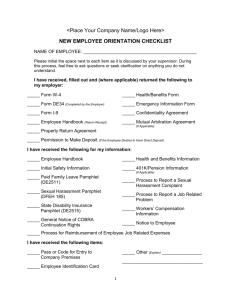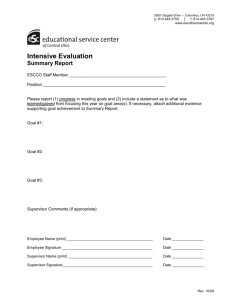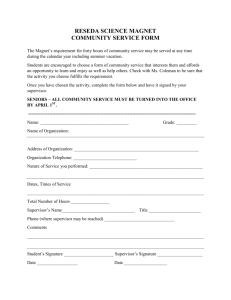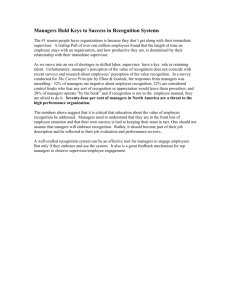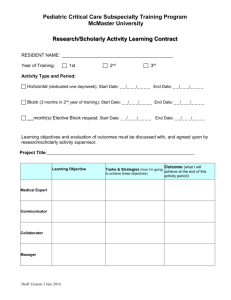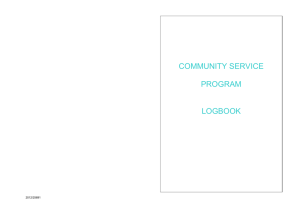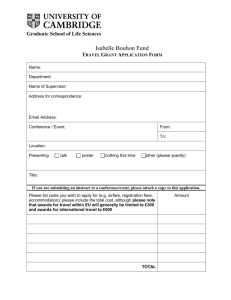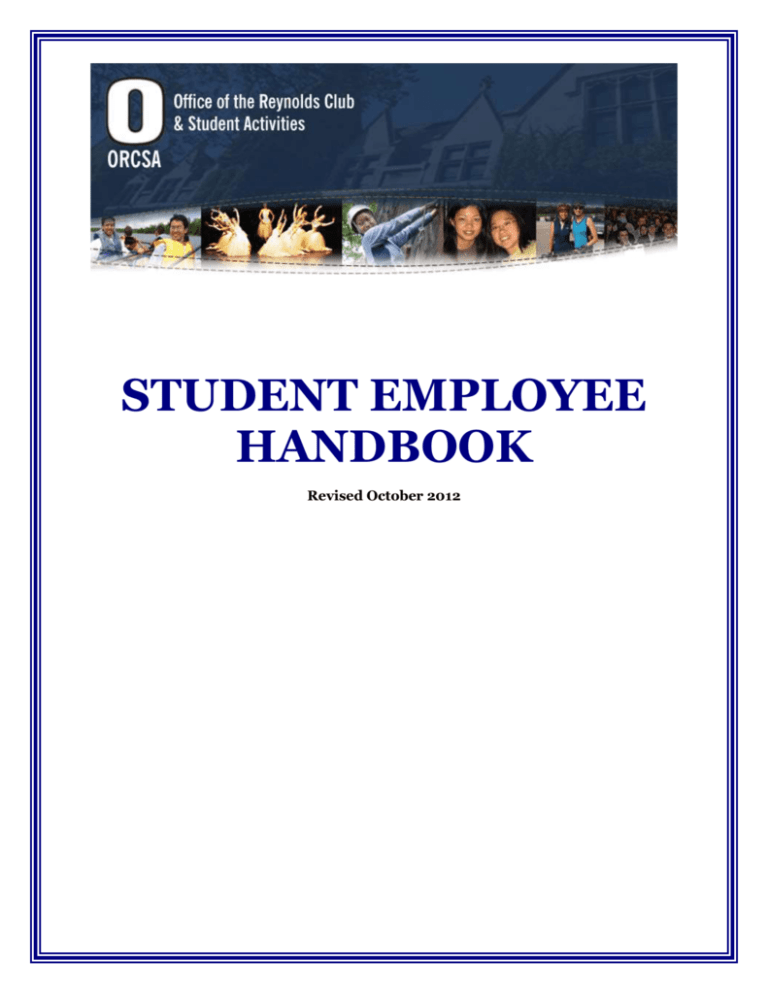
STUDENT EMPLOYEE
HANDBOOK
Revised October 2012
Table of Contents
STUDENT EMPLOYMENT
Definition of Student Employee
Purpose of Student Employment
Purpose of ORCSA Student Employee Handbook
ORCSA facility operations
Important numbers to know
EXPECTATIONS & POLICIES
Non-Discriminatory Conduct
Professionalism
Dress Code
Workspace
Office Equipment : Phones, Copy and Fax Machines
Work Schedule
Attendance
Time Reporting
Time off
Ending Employment
Confidentiality Agreement
Disciplinary Action
OFFICE ETIQUETTE
Customer service
Telephone & phone coverage
PROCEDURES
Copy Machine
Printing
ATTACHMENTS
Student Employment
Civil Behavior in a University Setting
Sexual Harassment
Equal Employment Opportunity
Treatment of Confidential Information
Progressive Corrective Action
Substance Abuse
2
Student Employment
Definition of Student Employee
o A student employee is one who is primarily pursuing an educational goal at the
University of Chicago. Student employees must be enrolled at least half-time
(200 to 299 total units of registered course credit per quarter).
o
Student employees are limited to working a maximum of 19.5 hours per week
during the academic year (39 hours per pay period), and do not receive sick leave,
vacation, holiday pay or any other employee benefits.
Purpose of Student Employment
o The Office of the Reynolds Club & Student Activities (ORCSA) provides student
employment opportunities to allow students to gain work experience, develop
good work habits (such as punctuality, understanding and following directions,
and working effectively with others) as well as help finance their education while
enrolled in the University.
o
ORCSA (Office of the Reynolds Club & Student Activities) is known for being one
of the best places to work on campus. Our student staff is integral in maintaining
the level of service the University of Chicago community has come to expect.
o
Student employees are hired to fill a specific role at ORCSA and support the
activities and services provided by ORCSA.
o
ORCSA Student Staff Positions:
Reynolds Club:
Reynolds Club Program Assistants
Student Activities Center Attendants
Building Managers
Facilities and Event Crew
Office Assistants
Scheduling Assistants
Financial Operations Assistants
Marketing and Design Assistant
Pub Attendants
Mandel Hall:
Lighting and Sound Technical Assistants
Scheduling Assistant
Student run coffee shops: Cobb, eX Libris ,Hallowed Grounds & Harper Cafe:
Counter staff positions
Management positions
Purpose of ORCSA Student Employee Handbook
ORCSA publishes the ORCSA Student Employee Handbook to outline expectations and
policies, and to detail office procedure. Please note that even though select official
University of Chicago policies are reproduced in the Attachments section for your
3
convenience, this publication is not comprehensive and therefore does not cover a
number of official guidelines and procedures.
For a comprehensive treatment of University employment policies, student employees
must refer to the University of Chicago Employee Handbook located on the web at
http://hrservices.uchicago.edu/fpg/forms/employeerelations/EmployeeHand
book.pdf
The Reynolds Club:
The Reynolds Club is the hub of student activities on campus. It is the home of the
Student Activities Center, University Theater, Hallowed Grounds (student run coffee
shop) and dining services. The ORCSA Financial Operations Office is located in room
003, the Facilities Office is in room 006, and the Student Activities Center is located in
room 001, all in the lower level of the Reynolds Club. Most of the ORCSA advisors and
management team have their offices in the Reynolds Club. The building hours are
Monday – Saturday: 7:00 am-12:00 am and Sunday: 9:00 am- 12:00 am.
The Reynolds Club Facility Office manages the scheduling of Bartlett Hall, Harper
Classrooms, Stuart Classrooms, and University Quads. This office also manages the Pub
located in the lower level of Ida Noyes Hall. The hours of operation for the
Reynolds Club Facility Office is Monday-Friday: 8:30 am-5:00 pm.
Mandel Hall:
Seating nearly 1,000 guests, Mandel Hall is the University’s largest concert and assembly
hall. During the school year it houses cultural shows, dance recitals, comedy shows,
symposiums, symphonies, and other musical concerts.
Student run coffee shops
Cobb Coffee Shop:
Basement of Cobb Hall
M-F 7:30a - 4:30p
Sa-Su Closed
Hallowed Grounds:
2nd Floor of Reynolds Club
M-F 8:30a - 11:30p
Sa 11:30a - 9:00p
Su 11:30a - 11:30p
Harper Cafe:
3rd Floor of Harper Memorial Library
M-Th 9:00a - Midnight
F 9:00a - 5:00p
Sa Closed
Su 12:00p - Midnight
eX Libris:
1st Floor of Regenstein Library
M-Th 8:30a - 11:30p
F 8:30a - 5:00p
Sa 11:00a - 5:00p
Su 11:00a - 11:30p
4
Important Phone Numbers
University Police
o
o
o
o
o
From a campus phone 2-8181
From any phone 773.702.8181
From an emergency phone: push button
Fax 773.702.1828
email cops@uchicago.edu
Safety and Emergency Resources
o
o
o
o
o
o
o
Dean on Call 773-834-help (4537)
Sexual Assault Dean on Call: A person may contact the Sexual Assault DOC at any
time by calling the UCPD Dispatch at (773)702-8181 or 123
Discriminatory Dean on Call (BART): Found no information, the regular DOC seems
to cover unlawful discrimination & Harassment
Chicago Rape Crisis Hotline (888)293-2080
Resources for Sexual Violence Prevention (773) 834-7738
Poison Control Center (800) 222-1222
University Facility Services (773)834-1414
Counseling/Mental Health Resources
o
o
Student Counseling & Resource Center (773)702-9800
Therapist on Call: (773)702-3625
Medical Resources
o
o
o
Physician on call: (773)702-6840
Student Care Center (773)702-4156
Mitchell Hospital Emergency Room (773)702-6250
Academic/Administrative Resources
o
o
Office of the Vice President & Dean of Students (773)702-7770
Student Ombudsperson (773)702-8422
Expectations & Policies
Using Your Supervisor as a Resource
Your supervisor is your key resource person concerning University of Chicago policies and
procedures. If you have any questions about which policy applies to a particular situation,
consult your supervisor for clarification. Your progress on the job is one of your supervisor's
most important concerns. Never hesitate to ask questions or seek your supervisor's advice
and guidance.
5
In the event of harassment or any other inappropriate behavior on the part of your direct
supervisor, employees may seek guidance from Jennifer Kennedy, Interim Director of the
Office of the Reynolds Club & Student Activities; Charles Fitzpatrick, Associate Director for
Financial Advising or direct their complaint to University Human Resources Management
(UHRM) at 773-702-8900.
Non-Discriminatory Conduct
o The University of Chicago strives to maintain a work environment free from
intimidation, threats (direct or implied) or violent acts. The university will not
tolerate intimidating, threatening or hostile behavior of any kind (See the Sexual
Harassment and Equal Employment Opportunity policies in the
Attachment section).
Professionalism
o As a student employee, you are expected to exhibit a high degree of
professionalism while working in the office. Many workspaces are within public
view, therefore your conduct should always reflect positively upon you, ORCSA,
and the University.
Dress Code
o Student employees are expected to present a neat, professional appearance.
o If you have any questions regarding the dress code, please see your supervisor.
Workspace
o Keep your workplace clean.
o At the end of the day, log out of your computer and put away any office related
materials. Sensitive or valuable materials should not be stored in office unless
arrangements have been made with supervisor.
Office Equipment
o Phones
The phones in the office are for business purposes only.
Long distance phone calls are NOT allowed without permission from a
full-time ORCSA staff member.
Personal phone calls are discouraged during work hours. You may take a
message and return the call after work hours.
o
Copy and Fax Machines
Copy machine and fax machine are located in the facility office 0f Ida
Noyes Hall, room 106. In the Reynolds Club, there is a copy machine and
fax machine in the Facilities Office, room 006. These machines are for
business purposes only. There are copy machines and a fax machine in
the Student Activities Center, room 001. These machines are for general
use for RSO’s and members of ORCSA staff.
ORCSA copy codes are to be used by ORCSA staff and student employees
for business purposes only. These codes are not to be abused (used for
personal use) or shared with anyone else.
Personal usage is not allowed, unless an ORCSA staff member grants
permission.
Work Schedule
o You are responsible for bringing to the attention of your supervisor any requests
for a change to your work schedule once your work schedule has been set.
6
o
In some cases, you will be responsible for finding a replacement for your shift.
Attendance
You are expected to show up to work, ready to work at the beginning of your
scheduled shift.
Punctuality is expected of all student employees, as you may be relied upon to
provide office coverage.
If you anticipate being late for your scheduled hours, contact your supervisor as
soon as possible.
Frequent tardiness is careless, inconsiderate, and inconvenient to others and will
result in disciplinary action as outlined in the University’s policy of Progressive
Corrective Action (see Attachment section).
ORCSA adheres to the University’s policy of Attendance (see Attachment
section).
Time Reporting
You will be responsible for logging in and out and the beginning and end of each
of your shifts. You are responsible for keeping an accurate and complete record
of your time. You should log in and out at the computer terminal provided in
your office space or café.
You should notify your supervisor immediately if you forget to log in or log out.
A training on uchicagotime, the University’s time management system can be
found at http://uchicagotime.uchicago.edu/training/Employee_training.shtml
Student employees are paid every two weeks. The pay period lasts two weeks,
beginning on a Sunday and ending on a Saturday. You will receive your paycheck
on the Friday following the close of a pay period. You may pick up your check in
the financial office, room 003 in the basement of the Reynolds Club. Each
employee is responsible for picking up their own paycheck. If you can not pick up
your paycheck, you may make arrangements with your supervisor to have
someone else pick it up for you.
Employees are strongly encouraged to enroll in the Payroll Electronic Funds
Transfer Program. In this program, you authorize the University through the
Payroll Department to deposit your pay automatically to your checking or savings
account. Your earnings are credited to your bank account. On payday, instead of a
check, you receive a Pay Advice Statement which serves as your notice of deposit
and your record of payment. Payroll Direct Deposit Authorization Forms are
available online
You can update and access all of your information electronically including
copies of your W-2 forms and enrollment in Payroll Electronic Funds Transfer
Program online at ess.uchicago.edu
Time Off
o Requested Time Off: All requests for time off from your regularly scheduled
hours must be discussed verbally with your supervisor and followed by an email
that states the dates you are requesting off and the reasons. All time off is unpaid.
o Sick Days: If you are ill and unable to come to work, please call your supervisor
as soon as possible. If your supervisor is not available, please leave a
message/voicemail for your supervisor. In some cases, you will be responsible for
7
finding someone to cover your shift (as is the case for building managers, coffee
shop staff and office support staff.) Sick days are unpaid.
Ending Employment
o If at any point you choose to terminate your employment, you should notify your
supervisor at least two weeks prior to your intended end date.
o ORCSA retains the right to terminate your employment at any time for any
reason not prohibited by law, without prior notice. In the case of serious
infractions, you may, for example, be suspended and/or discharged on the first
offense. Such serious infractions include, but are not limited to the following:
Insubordination
Unauthorized possession or concealment of weapons while on the
premises
Possession, use, sale, or purchase of non-prescribed drugs and intoxicants
on University premises; working under the influence of alcohol or illegal
drugs.
Fighting or other inappropriate conduct while on the premises
Theft
Destruction of University property
Sleeping on the job
Falsification or improper alteration of records, including time cards and
time records
Mishandling or careless treatment of ORCSA patrons
Disclosure or misuse of confidential information
Misuse of the University's electronic information systems.
Confidentiality Agreement
o At times, sensitive information may need to be handled by student employees,
therefore all student employees are required to sign and comply with a
confidentiality agreement.
o Please insure any confidential documents are properly stored at the end of your
shift.
Disciplinary Action
o When deemed appropriate by your supervisor, student employee
discipline/counseling may occur. For minor infractions, verbal counseling may
occur. In the event of continued violations/infractions or serious infractions,
written counseling may occur. In some instances, serious infractions can lead to
immediate termination.
o ORCSA adheres to the University’s policy of Progressive Corrective Action
(see Attachment section).
8
Office Etiquette
One of the missions of the Office of the Reynolds Club & Student Activities is to provide a
comfortable and welcoming atmosphere. We must, however, be mindful that this is also a
place of business, therefore professionalism is expected. Below are some key points that ORCSA
staff members pay close attention to:
Customer Service
o Courtesy has to be given to each and every guest. This is a customer-oriented office,
and rude behavior on the phone, over e-mail, or in person will not be tolerated.
o
Professionalism is a must. Your presence in the office is the first that visitors see
and will make a lasting impression. When you are working behind the desk, do not
slouch, prop your feet on the furniture, bury your head in a book or magazine, sleep
or lay your head on the desk.
o
Ensure the office area is neat and presentable. Look through the eyes of a critical
visitor and ask yourself if it is an area that makes you feel comfortable and reflects an
office that cares about itself.
o
Only in emergency situations or with business of importance should the phone be
used for a personal call. If you are in the middle of a call and the phone rings or a
visitor comes to the desk, you must put your caller on hold or finish the
conversation.
Telephone
o
Sample Dialogue
Always answer with a friendly greeting. Example:
“Office of the Reynolds Club and Student Activities, this is
_______. How may I help you?” You must identify yourself when
answering the phone.
-“May I speak with Jen Kennedy?”
“Yes, may I ask who’s calling please?”
-This is_______.”
“One moment please” or “Please hold”
Place the caller on hold by pressing the hold button. If you do not know
how to place a call on hold, you are responsible for asking your supervisor
for assistance.
o
When taking messages, always offer the options, “Would you like to leave a
message” or “Can I transfer you to his/her voicemail?” When taking a message,
clarify and confirm what you have written before the caller hangs up. This will
eliminate errors. Place the message in the proper mailbox or deliver it
personally.
o
Speak clearly
o
Do not give out personal information (i.e. personal phone number or cell
number, personal whereabouts, home address, home phone number, etc.) of
ORCSA full time staff or student staff.
9
o
Do not transfer a call without letting the person know where they are going. If
you are transferring the call to another office, you should give them the number
in case you get disconnected.
o
Never make anyone feel like they are bothering you or wasting your time.
o
Offer suggestions or options when dealing with a problem you cannot fix; do not
advise.
o
Do not attempt to discuss what could be confidential, i.e.: another student or
account. Tell the caller that he/she must speak with a staff member – then
connect the caller to a staff member or take a message.
o
Thank the person for cooperating.
o
Ensure that any requests will be fulfilled. Then follow through.
Transferring a call
With the person on the line or on hold:
1. Press transfer button;
2. Listen for dial tone;
3. Dial internal extension;
4. Announce call, if desired;
5. Hang up handset.
(When applicable)
Retrieving Voicemail Messages
If your responsibilities include checking a voice mail, follow these steps: To
retrieve messages from the phone, press the “message” button and enter the pass
code as given to you by your staff supervisor.
Office Equipment Procedures
COPY MACHINE
In the Reynolds Club, there are four copy machines located in the basement floor. Two
copy machines are located in room 001, the Student Activities Center, one is located in
the financial operations office room 003 and one is located in the facilities office in room
006. Please note that the copy machines in 001 are the ones that should be used most by
student group members. ORCSA staff may use the additional copy machines as needed.
In the Ida Noyes Hall facilities office, there is one copy machine. This copy machine is
used by RSO members as well as ORCSA advisors.
To use the copy machine, enter the ORCSA copy code (as given by your supervisor)
before attempting to copy. Then, enter the number of copies, load the documents to be
copied (either in the top feeder or by lifting the top and placing the documents on the
glass one at a time) and press the “Start” button on your right. When done, please DO
NOT forget to press “Log Out” twice to delete the code from the system. Don’t forget to
remove your copies and the originals from the machine.
10
Attachments
This section contains a number of University policies and procedures concerning employment
by the University of Chicago. A detailed University of Chicago Employee Handbook can be
obtained online at
http://hrservices.uchicago.edu/fpg/forms/employeerelations/EmployeeHandbook.p
df should you require additional information on employment policies.
Student Employment
http://studentmanual.uchicago.edu/student_employment
A student employed by the University is employed only as an adjunct to his or her student
status. As such, a student in the College, a masters’ program, or a professional school, or a
doctoral student in Scholastic Residence may be employed by the University no more than 19.5
hours per week during the school year. A doctoral student in Advanced Residence, depending
on the level of financial support and with the written consent of the Dean of Students of her or
his academic area, may be employed by the University for additional hours per week and thus
might be eligible for the appropriate employee benefits.
International students in J-1 or F-1 status should contact the Office of International Affairs with
any questions regarding their employment eligibility.
While employed by the University, the student is covered by the University’s personnel policies
and procedures and may be disciplined or terminated from employment for noncompliance.
Upon employment, it is the student’s responsibility to ask his or her supervisor for a copy of the
Employee Handbook and to become acquainted with the University’s policies. While employed
at the University, the student may come in contact with personal or confidential information,
including personnel records, student records, donor and alumni information and, if employed at
the Medical Center, patient records. Information a student learns on the job should stay on the
job and not be discussed outside the workplace or in inappropriate ways within the workplace.
Unauthorized disclosure of confidential information may result in discipline, including
discharge and student disciplinary charges. Questions regarding student employment should be
addressed to the student’s supervisor or area dean of students.
Before accepting a position, a student should make an effort to understand the duties and
responsibilities of the position. A student employee is expected to follow payroll procedures
carefully and to report hours worked accurately and in a timely manner. The student should
discuss problems with or questions about the job with his or her immediate supervisor. A
student who decides to leave a job should give the supervisor at least two weeks notice.
Civil Behavior in a University Setting
https://studentmanual.sites.uchicago.edu/university#Civil
At the University of Chicago, freedom of expression is vital to our shared goal of the pursuit of
knowledge, as is the right of all members of the community to explore new ideas and learn from
one another. To preserve an environment of spirited and open debate, we should all have the
opportunity to contribute to intellectual exchanges and participate fully in the life of the
University.
The ideas of different members of the University community will frequently conflict and we do
not attempt to shield people from ideas that they may find unwelcome, disagreeable, or even
offensive. Nor, as a general rule, does the University intervene to enforce social standards of
civility. There are, however, some circumstances in which behavior so violates our community’s
11
standards that formal University intervention may be appropriate. Acts of violence, and explicit
threats of violence directed at a particular individual that compromise that individual’s safety or
ability to function within the University setting are direct affronts to the University’s values and
warrant intervention by University officials. Abusive conduct directed at a particular individual
that compromises that individual’s ability to function within the University setting and/or that
persists after the individual has asked that it stop may also warrant such intervention. Even if
formal intervention is not appropriate in a particular situation, abusive or offensive behavior
can nonetheless be inconsistent with the aspirations of the University community, and various
forms of informal assistance and counseling are available.
Sexual Harassment
https://studentmanual.sites.uchicago.edu/unlawful
Sexual harassment by any member of the University community is prohibited. This prohibition
includes peer harassment as well as harassment by an individual in a supervisory position. The
University will take all necessary actions to ensure a professional and nondiscriminatory work
environment, free from sexual harassment. The Affirmative Action Officer is the University
official responsible for coordinating adherence to this policy and to related federal and state
laws and regulations.
The University provides several avenues for reporting complaints of sexual harassment. You
may discuss your concerns with your supervisor, department chair, dean or director or contact
UHRM - Employee/Labor Relations. You may also contact the Affirmative Action Officer
directly or one of the Sexual Harassment Complaint Advisors listed in the University directory.
Please refer to the Sexual Harassment Policy Summarized on the University of Chicago website
or the Sexual Harassment Policy in the Personnel Policy Index for more information.
Equal Employment Opportunity (EEO)
http://hhttp://hrservices.uchicago.edu/fpg/policies/200/p201.shtmlr.uchicago.edu/policy/p20
1.html
The University of Chicago recruits, hires and promotes employees and prospective employees on
the basis of individual merit and without regard to race, color, religion, sex, sexual orientation,
national or ethnic origin, age, disability, veteran status or other factors irrelevant to
participation in the programs of the University. This policy includes the University's
commitment to maintain a work place free from sexual harassment or illegal discrimination of
any nature. The Affirmative Action Officer is the University official responsible for coordinating
adherence to this policy and related federal, state and local laws and regulations.
If you have a complaint of illegal harassment or discrimination, it should ordinarily be taken to
your supervisor, department chairman, department head, dean, or director. You may also direct
such complaints to Human Resources Management, Employee/Labor Relations at 773-7026010 or to the Affirmative Action Officer at 773-702-5671. Employees and applicants can raise
concerns and make reports without fear of reprisal, intimidation, threats or coercion. Your
complaint will be investigated on a timely basis and in a confidential manner. If you have a
disability and identify yourself as disabled, Human Resources Management invites you to
initiate the accommodation process, which may include submitting medical documentation and
suggesting reasonable ways in which the work environment at the University can better
accommodate your disability. Your submission of this information will be kept confidential
except where necessary for job performance purposes such as working out appropriate
accommodations, restrictions in activities, or problems of safety. Direct your questions to your
supervisor or the Employment Services Office.
12
Treatment of Confidential Information
http://hr.uchicago.edu/policy/p601.html
ORCSA student employees have a general obligation to keep all work-related matters
confidential and protect against the unauthorized disclosure of confidential information.
Student employees are responsible for adhering to the complete confidentiality policy, of which
only a part is reproduced here. For the complete University policy regarding the treatment of
confidential information, please visit the link above [Policy 601 on the HR website].
Confidential information, materials, and records include but are not limited to:
payroll records and information regarding salary
Social Security Numbers
personnel records [See Policy U705, Employee Access to Personnel Records.]
computer system passwords and security codes
research results not yet published, including manuscripts and correspondence
budgetary, departmental, or University planning information
litigation or other formal charges pending or in process and investigation of complaints
patient care records including patient benefit plan enrollment, claims, billing matters, and
data concerning research subjects
student records
donor and alumni information
medical information and information designated as "Protected Health Information" under
the Health Insurance Portability and Accountability Act (HIPAA)
Progressive Corrective Action
http://hrservices.uchicago.edu/fpg/policies/700/p703.shtml
The progressive corrective action procedure is designed to identify and correct problems that
may affect your work performance or the overall performance of your department. This process
provides you and your supervisor with an opportunity to talk about specific problems, to
determine when and how these problems can be corrected, and to agree to set goals and followup dates.
Progressive Corrective Action refers to these steps:
Step 1 - Counseling and/or verbal warning
Step 2 - Written warning
Step 3 - Suspension
Step 4 - Discharge
Depending on the situation, steps 1, 2 or 3 may be repeated, skipped or not followed in
sequence. Each case is considered on an individual basis by ORCSA with the input of Human
Resources Management. The University retains the right to terminate your employment at any
time for any reason not prohibited by law, without prior notice. In the case of serious
infractions, you may, for example, be suspended and/or discharged on the first offense. Such
serious infractions include, but are not limited to the following:
Insubordination
Unauthorized possession or concealment of weapons while on the premises
Possession, use, sale, or purchase of non-prescribed drugs and intoxicants on University
premises; working under the influence of alcohol, illegal drugs or intoxicants.
Fighting or other inappropriate conduct while on the premises
Theft
13
Destruction of University property
Sleeping on the job
Falsification or improper alteration of records, including time cards and time records
Disclosure or misuse of confidential information
Misuse of the University's electronic information systems.
Substance Abuse
http://hrservices.uchicago.edu/fpg/policies/600/p604.shtml
The University recognizes both alcohol and drug abuse as potential health, safety and security
problems. You are expected to cooperate in maintaining an environment free from the effects of
alcohol and other drugs. The University prohibits all employees from the unlawful manufacture,
possession, use, distribution, sale or purchase of alcohol and illicit drugs on University premises
or as part of any University activities, and from working under the influence of alcohol or illicit
drugs. The only exception applies to moderate consumption of alcohol at approved University
functions for individuals of legal drinking age.
Confidentiality Agreement
I.
Confidentiality and FERPA
The Family Educations Rights and Privacy Act (FERPA) is a federal statue that
protects the privacy of student “education records.” Under FERPA, the term
“educational records” includes all University of Chicago “records, files, documents,
and other materials which (1) contain information directly related to a student; and
(2) are maintained by [the University of Chicago] or by a party acting for [the
University of Chicago].” The term “education records” includes but is not limited to
grades, midterm progress reports and class schedules.
Under FERPA certain information, known as “directory information,” may be
disclosed by University of Chicago to outside parties, unless the student has
specifically requested that this information not be released. The University of
Chicago consider the following to be directory information: name, local address,
electronic mailing address, telephone listing, major field of study (including degree
program field, major, minor, year of study and/or class information), awards and
honors, participation in officially recognized activities and sports, weight and height
of members of athletic teams, dates of attendance, degrees, the most recent
educational agency or institution attended, and similar information.
The University is committed to full compliance with FERPA.
II.
Confidentiality and Working in ORCSA
In light of the nature and goals of ORCSA, during your employment you may become
privy to FERPA-protected educational records and directory information, as well as
other private student information that may not necessarily be protected by FERPA
but nevertheless is of sensitive nature (i.e. financial or family information).
With regards to student educational records, it is critical and essential for you to
comply with FERPA and not disclose such records. With regard to student directory
information, you should not assume that a student has not objected to the release of
that information. Instead, you should not release any directory information without
first checking with, and obtaining the approval of, the Director of ORCSA. With
14
regard to other student information that may not necessarily be covered by FERPA,
you must maintain such information in the strictest of confidence and must not use it
outside of ORCSA under any circumstances absent the express consent of the
Director of ORCSA.
Any misuse of FERPA educational records and directory information, or any
sensitive student information, will result in your dismissal from our office and may
result in other University disciplinary actions.
III.
Agreement
I acknowledge that, as an employee of the University of Chicago, confidential
information may be made known to, or learned by, me during the course of my duties
via various sources including, but not limited to, educational records, directory
information, payroll records, Social Security numbers, and pass codes. I further
acknowledge that making this information known or available to others who do not
have a legal right thereto may violate the Family Educational Rights and Privacy Act
of 1974 (FERPA), as well as the terms of my employment. Therefore, I agree that I
will not reveal, make known, or provide access to confidential information except to
those having legal or otherwise permissible right thereto. Furthermore, I agree not to
access confidential information to which I have designated rights for any reason
other than the performance of my duties as an ORCSA Employee. I understand that
failure to comply with the terms or conditions of this agreement shall subject me to
discipline in accordance with University of Chicago’s Personnel Policy.
FERPA information is available on the web at:
http://www2.ed.gov/policy/gen/guid/fpco/ferpa/index.html
For the complete Human Resources policy on the treatment of confidential
information, visit: http://hrservices.uchicago.edu/fpg/policies/600/p601.shtml
15
16



